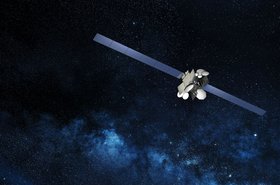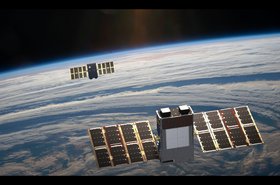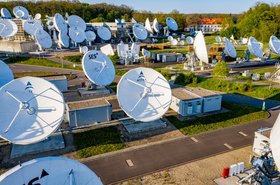SpinLaunch, a company looking to throw satellites into orbit, has secured investment and signed a contract to deploy its own broadband satellite fleet.
The California-based company this week announced a $12 million strategic investment from Kongsberg Defence and Aerospace. It also announced plans for Meridian Space, a new low-earth orbit (LEO) satellite broadband constellation.
The fleet will comprise more than 250 70kg microsatellites that, at full network build-out, will be able to offer “dozens of terabits per second of global capacity,” according to the company – though it says more than 2Tbps on its website.
According to SpaceNews, the company aims to serve 5G non-terrestrial network (NTN) protocols and operate in the Ka-, Ku-, and V-band frequencies.
“SpinLaunch was founded on a bold commitment to deliver a more sustainable, cost-effective approach to launching satellite constellations – a vision that logically involved considering our own global network from the outset,” said David Wrenn, CEO of SpinLaunch.
“Starting in 2020, we accelerated that vision and ramped up development of the constellation, and we are now excited to officially bring our low-cost, dynamic communications service to enterprise customers worldwide.”
SpinLaunch said its “ultra-efficient reflectarray antenna technology” lowers satellite mass and size, reducing the cost of launching the constellation.
While Konsberg will be investing in SpinLaunch, the former’s NanoAvionics unit has secured a €122.5 million ($136m) contract from SpinLaunch in return to develop 280 satellites – as well as two prototypes, one of which is an in-orbit demonstrator (IOD) mission planned for 2026.
The IOD mission will demonstrate Meridian’s communications payload onboard NanoAvionics’ MP42 microsatellite bus. For the commercial deployment, the companies will develop a tailored satellite optimized for higher performance and launch efficiency.
“The Meridian Space solution, supported by Kongsberg, will offer significantly higher broadband capacity in a satellite constellation compared with what is available on the market today,” said Eirik Lie, president of Kongsberg Defence & Aerospace.
“Kongsberg’s decision to partner with SpinLaunch reflects our belief in their innovative approach to satellite communications.”
According to SpinLaunch’s 2021 spectrum filings, the Meridian fleet could grow to more than 1,200 satellites.
NanoAvionics will ramp up its manufacturing capabilities with the addition of a new assembly and testing facility at its European headquarters in Vilnius.
“Our collaboration with SpinLaunch is a clear example of how NanoAvionics enables complex satellite missions with standardized, scalable technology,” said Atle Wøllo, CEO of NanoAvionics.
"Their team has an impressive track record in disruptive engineering which, combined with NanoAvionics' industry-leading small satellites, will open a new chapter in the NewSpace industry and satellite communications.”
Founded in 2014, SpinLaunch aims to send satellites into orbit using kinetic mass accelerator technology. The idea is to use electromagnets to accelerate a robotic arm and payload within a vacuum and then slingshot it with enough momentum to reach the upper atmosphere, from where rockets would take over. The technology could potentially offer a cheaper way to send payloads to orbit than traditional rocket-based launches from the ground.
SpinLaunch’s centrifuge is reportedly able to spin a rocket up to 4,700 mph (7,500km/h – generating forces up to 10,000Gs) and release it to an altitude of roughly 200,000ft (60km). The rockets are thought to be able to carry payloads of up to 440 lb (200kg).
The company currently has a test accelerator in Spaceport America in New Mexico. It also plans to develop a second launch platform on Adak Island, Alaska.
SpinLaunch previously announced a $71 million Series B round in September 2022 and, at the time, said it had raised $150 million to date.







